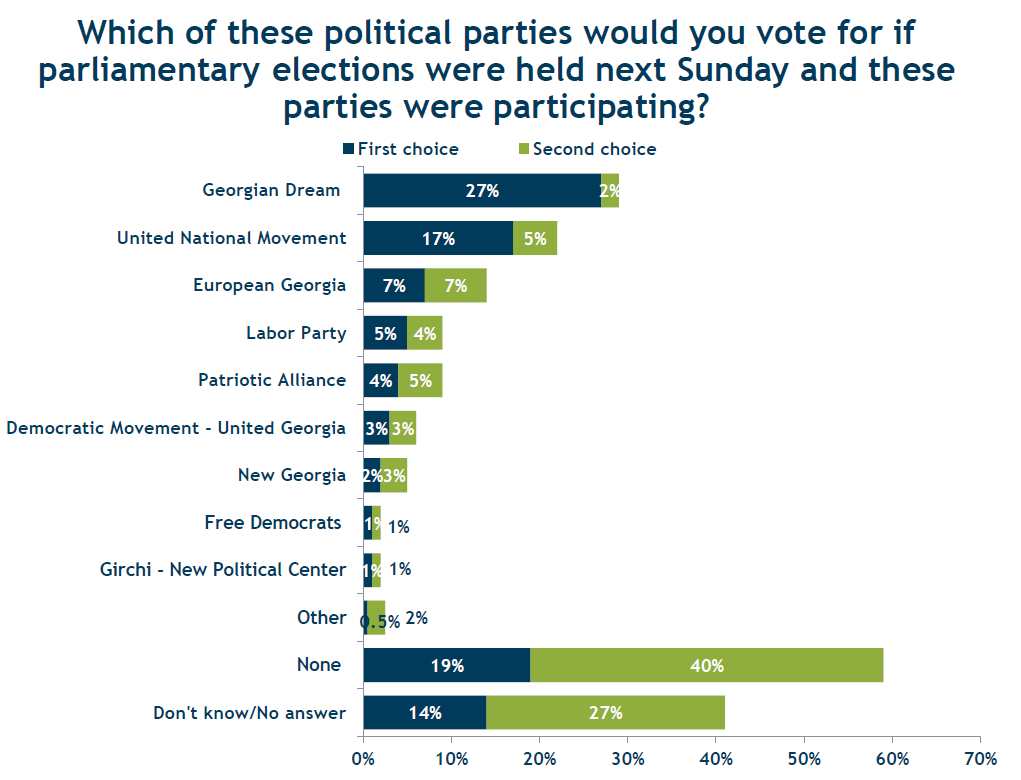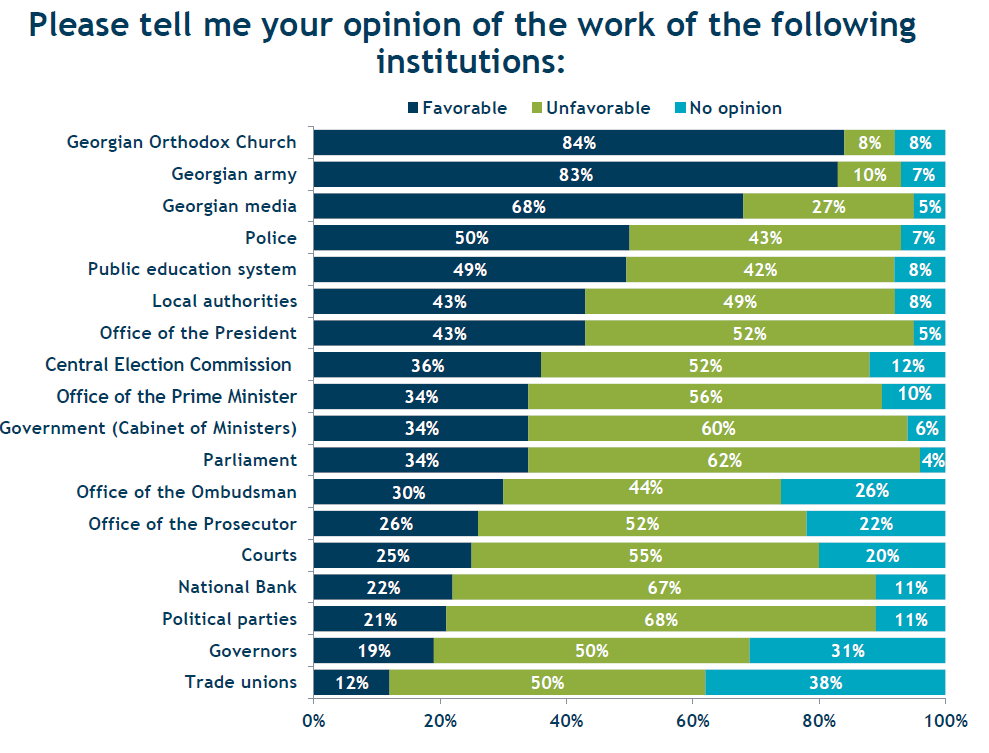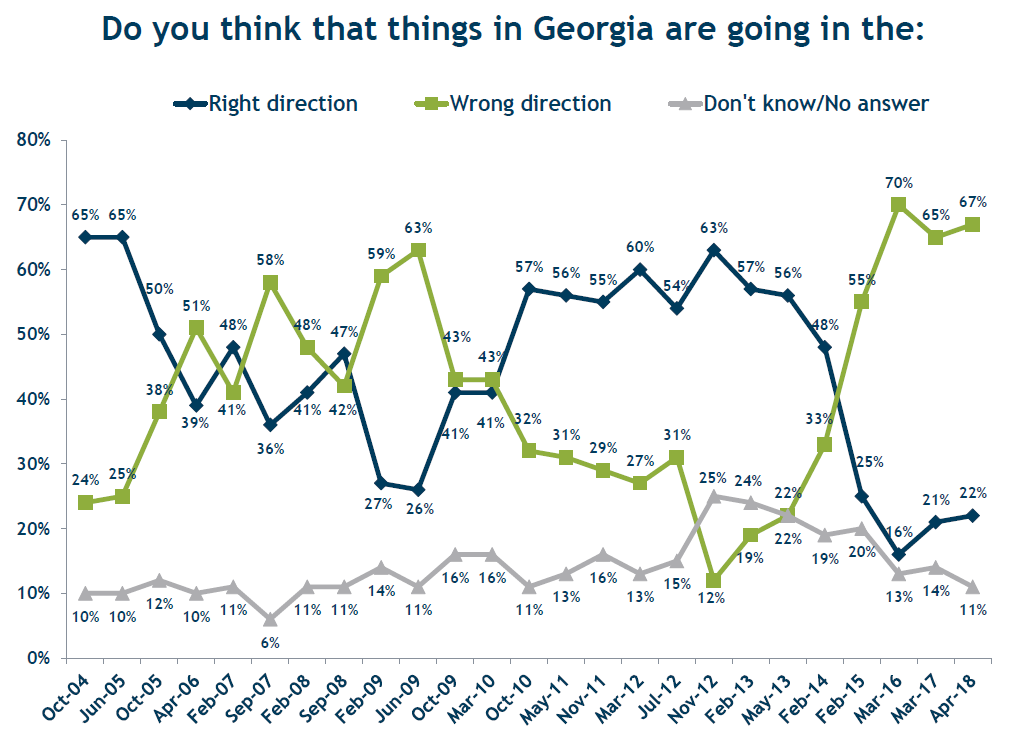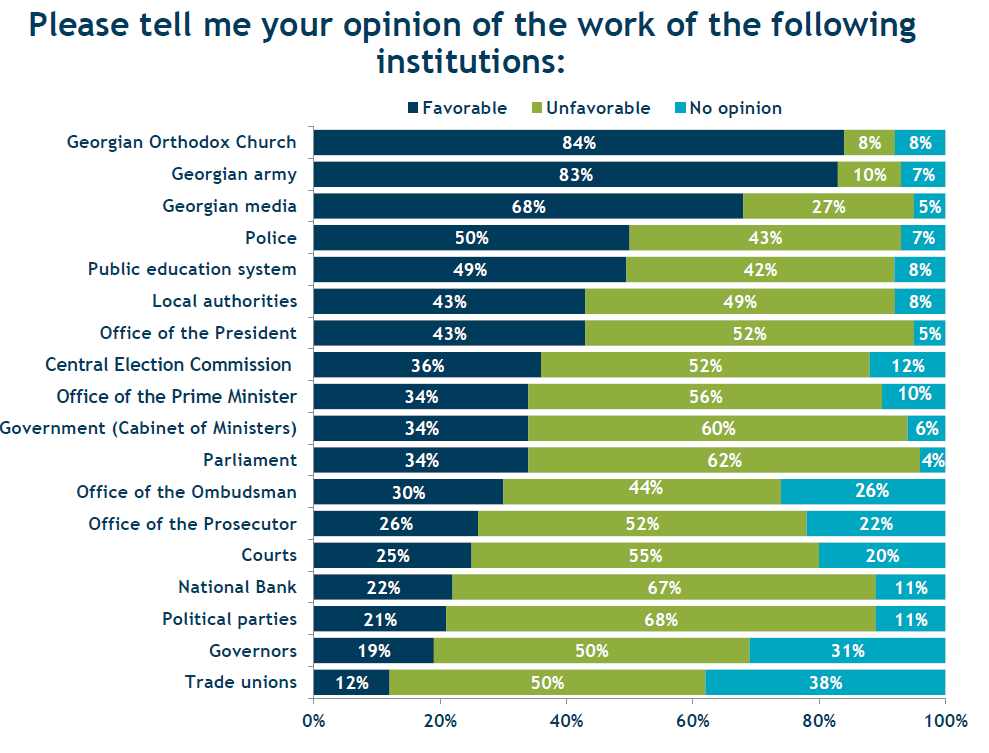
Political Ratings and Public Attitudes in IRI-commissioned Poll
A recent public opinion poll shows the ruling Georgian Dream-Democratic Georgia in lead with 27% support among survey respondents, followed by the United National Movement and the European Georgia with 17% and 7%, respectively.
The poll, released on Tuesday, was conducted by Baltic Surveys/The Gallup Organization for the International Republican Institute (IRI) between April 10-22, 2018. The survey was conducted through nationwide face-to-face interviews (excluding occupied territories) with 1,500 respondents and has a margin of error of 2.5%.
GDDG leads, UNM second, many have no favorites
According to the part of the public opinion survey, which examines voting intentions of respondents if parliamentary polls were held the following Sunday, GDDG currently has 27% support among respondents (up from 26% in 2017). GDDG nationwide party-list vote results stood at 55.81% in the October 2017 Municipal Elections.

Responses to the same question, show UNM with 17% support (up from 15% in 2017), followed by the European Georgia – 7% (same as last year); the Labor Party – 5% (down from 6%); the Alliance of Patriots– 4% (same as last year), and the Democratic Movement – 3% (up from 2%). 19% of respondents said they would vote for none of the parties and 14% either did not know or refused to answer, but additional 40 and 27% respectively have indicated these options as their second choice.
The survey also examines favorability rating of politicians. The minority leader Davit Bakradze (European Georgia), President Giorgi Margvelashvili (independent), and Tbilisi Mayor Kakha Kaladze (GDDG) lead with 53%, 52% and 50%, with their negative ratings standing at 40%, 42% and 44%, respectively.
They are followed by Healthcare Minister Davit Sergeenko , Prime Minister Giorgi Kvirikashvili (both GDDG) and Labour Party’s Shalva Natelashvili with 49%, 41% and 34% favorability ratings, respectively.
Bakradze and Natelashvili have the highest favorability rating among opposition politicians, followed by Grigol Vashadze and Nika Melia of the United National Movement with 32% and 31%, respectively.
Trust in institutions: Church still leads, executive, police crumble
These political ratings are part of a broader public opinion survey, which also looks into public attitudes towards multiple issues related to domestic politics and foreign affairs, including confidence in institutions.

According the poll, the Georgian Orthodox Church enjoys the highest support with 84%, compared to 88% in 2017, followed by the Georgian army – 83%, down from 86%; Georgian media – 68%, down from 74%; police – 50%, down from 59%; education system – 49%, down from 52%; local authorities – 43%, up from 37%; Office of the President – 43%, down from 55%; Central Election Commission – 36%, down from 40%; Office of the Prime Minister – 34%, down from 45%; Cabinet of Ministers – 34%, down from 38%; Parliament – 34%, down from 39%; Office of the Ombudsman – 30%, down from 39%; Office of the Prosecutor – 26%, down from 31%; courts – 25%, down from 30%.
Somber mood, unemployment key concern
67% of respondents think that Georgia is moving in the “wrong direction,” up from 65% in 2017 and down from 70% in 2016. 22% think that the country is moving in the “right direction,” up from 21% in 2017, and 11% either did not know or refused to answer.

Like previous similar surveys, the new one again shows that unemployment remains the top concern for most of the respondents, followed by economy, territorial integrity and social problems.
EU support high, NATO down, fear of Russia on the raise
85% of respondents are supportive of Georgia’s European Union membership (down from 90% in 2017), and the support for joining NATO stands at 77% (down from 82% in 2017), according to the poll.

27% of respondents believe that Georgia’s foreign policy approach should be only “pro-EU/pro-Western” (up from 23% in 2017), while 50% think that it should be “pro-Western,” but the country should, simultaneously, “keep up relations with Russia” (down from 53%). 12% want Georgia to be “pro-Russian but remain an ally of the EU/the West” (same as in 2017), and 2% would like to see Georgia “pro-Russian” only (down from 3%).
Georgian government’s handling of relations with Russia is assessed positively by 36% of respondents (down from 54% in 2017) and negatively by 52% (up from 35% in 2017); 85% of respondents think that Russia is a “threat” (up from 73% in 2017).
TV still main news media, Imedi TV, Rustavi 2, tied at the top; Internet share is growing
Georgian television channels remain the main source of information about current international affairs for 90% of respondents (93% in 2017), followed by Georgian internet news and social media – 22% and 11%, respectively (21% and 13% in 2017).
6% of respondents identified Russian TV as the main source of information on international affairs, which is down by 1% compared to 2017.
76% of respondents said that they regularly watch Imedi TV, down from 80% in 2017. The figure for Rustavi 2 TV, which led the list until 2017, declined to 72%. Georgian Public Broadcaster and TV Pirveli have 20% and 18%, respectively. 38% of respondents trust Rustavi 2 (down from 44% last year), while 31% trust Imedi TV (down from 33% last year).
This post is also available in: ქართული Русский